Ethiopian roads were totally different – amazing scenery, rolling hill country with roads that wound round them providing vistas across the Rift Valley that bisects the south of the country – after the long straight roads of northern Kenya. And, hey, the joy of tarmac. Sure, I may have enjoyed the loose metalled roads north of Isola (at least on reflection), but nothing – repeat nothing – beats tarmac; and it began in Moyale. You don’t have to watch the road ahead so closely, and the scenery around you takes on a world of its own when seen from the moving bike. You have time to look around.
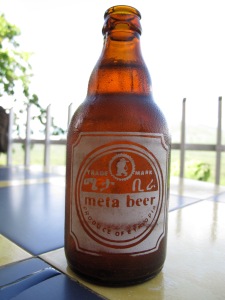
Can’t arrive in a new country without sampling the local brew; and it was alright too. About half the country follow the islamic faith, but this has not restricted the popularity of half dozen local beers.
Roadside entertainment
The main challenge of riding Ethiopia was one of attention – you have to keep your wits about you – for the roads are full of people, livestock and vehicles. After the empty deserts of northern Kenya, the lush green country of Southern Ethiopia represented real living space. There were people walking to work, children herding animals, families travelling in medieval donkey carts, small motorcycles and the occasional Land Cruiser – usually going much too fast. We had been warned that people would walk out in front of us in Ethiopia – stepping into the road without looking – and they did, they really did. We needed to remain alert and, being so alert, simply made riding that much more tiring.
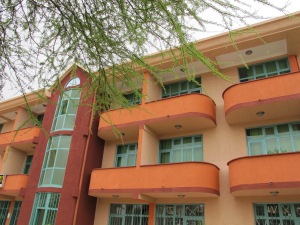
And we enjoyed the beer at our first stopover in Ethiopia at Moyale. Luxury indeed. Everywhere there are road travellers, the standards of the modern hotels has moved upmarket to meet demands. We had a balcony overlooking the road – a great place to watch the world go by
There was also the hassle factor. Every village and town had that set of characters which would project themselves at the road traffic. There were boys doing waggle dances shouting “You, you, you”; other young men would make rude or throat cutting gestures; occasionally one crazy guy would jump straight out into the road in front of us waving his arms; there were women with switched off expressions who wandering straight out into the traffic without looking either way; and, of course, there were the toddlers in rags darting out into the road oblivious to any danger.
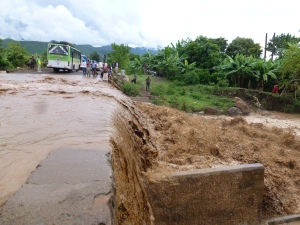
Flooded roads put us our schedule back, for we couldn’t attempt the deeper sections on light enuduro bikes; the flow was simply too strong.
Many people would wave or smile, but now and again people would throw things at us or make to hit out with sticks in a threatening way. It made me want to close the visor on my helmet when entering a village and shut myself in rather than open up so I could take in the scene – and this was against my natural instinct. My over-riding impression of Ethiopia is of a place of incredible natural beautiful, but with tired and desolate people – dispirited even. There was the poverty that you could see in the contradiction of people living in squalor, dressed in a combination of rags and grubby football shirts with the names of the most popular English clubs emblazoned across their chest – Arsenal, Manchester United and others. Everything was ramshackle and dirty – the colour of the soil itself.
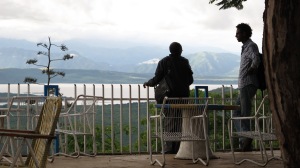
The Great African Rift bisects the southern half of the country; and there are no foreigner tourists around to enjoy it; a rift valley lake to yourself in fact.
Southern Ethiopia
We hit flooding north of Arba Minch on the way to Shashemene, where the road was about a metre deep in places with a raging torrent crossing it and dropping about 3 m to the right in a spectacular brown waterfall. It looked foreboding and dangerous. We had already ridden through some surface flooding, but this washout was too deep for us to risk going further with fully laden bikes. Buses and trucks were going through, but there was a queue ahead and people told us that there were three more washouts ahead some up to chest depth. But whatever really was ahead it was causing a jam of vehicles that tail-backed up the road. Reluctantly, we decided to turn back.
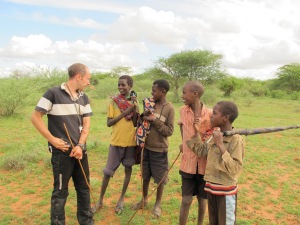
Kids were everywhere; inquisitive and demanding. That’s one thing that Ethiopia does well – boosting their population to around 85M people, with all the challenges that this brings to the modern state.
We had stayed at Moyale on the Kenyan border (very nice – highly recommended) and shared a double bed after our first taste of Ethiopian beer and food in a little thatched hut (again, very romantic). The next night we stayed in Yabelo (where the room was grubby but OK, where Kristian got sick and where the staff were miserable). We then moved on to Arba Minch on the edge of the Nachisor National Park where Kristian went down with a bug. It was a lovely place overlooking Lakes Chamo and Abaya, and with friendly staff and dogs. But the floods forced us to turn back and we ended up in Yabelo again – only this time at the other hotel in town where they wanted US$30/person/night. We bargained. Then we stayed at a place next to Lake Langano north of Shashemene. I think there were only one other set of guests in this weird lakeside resort. It had the filthiest bathroom that I’d met on the entire ride, and sprung mattresses so soft that they collapsed when you sat on them.
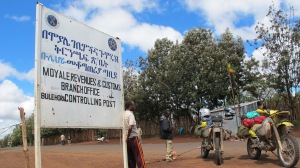
Like everyone else on the road, we got pulled over by the local authorities keen to make a dollar or two. We were fortunate, however, with the pragmatic approach taken, but things could have easily gone the other way.
We had a nice meal partly in the dark because of a power cut (as the only guests in a large restaurant) accompanied by some large kamikaze flying bugs, and then I got ill as well. The flooded roads and back-tracking had put another 200 km on our journey and this put pressure on our ride to Addis Ababa.
Hassles with Customs
One of my favourite experiences – looking back of course – was just after refuelling in Bule Hora and heading further north into Ethiopia. We were waved down at a roadside checkpoint and rolling up ready to stop Kristian got the leg of his bike suit caught on his foot peg and couldn’t put his foot down properly – he lost his balance and fell sideways on to me and I couldn’t hold both bikes up. So I fell over with Kristian and his bike on top of me – petrol was squirting out of the vent pipes, crowds of people were yelling and jumping around us trying to help, the Customs Officer started shouting at us and a tall young and attractive woman soldier came up to us looking very stern and slightly menacing with her machine gun in hand. There were many willing hands, of course, and it took only a moment to recover both bikes and riders; and all we lost from that particular episode was our dignity. But thing could also get worse.
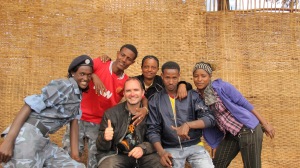
Everyone enjoys novelty; and this morning this was us. Check out the picture; see if you can identify the foreigner. (Hint: the one making with his thumb.)
Once right way up and smiles all round, we came up against local plod with the knowledge that our bike carnets – required for entering the country – were not in order. We’d sort of known that issues could arise, but optimistic as ever, figured we could sort them. The customs office on the Kenyan border at Moyale had been closed when we arrived, although the border was completely open – so we’d simply driven in; and then on. Not such a good decision on reflection, and reconfirmed by the Customs Officer at Bule Hora who said that we should have got our documents sorted in Moyale when entering the country. Moyale, of course, was now 200-300 km behind us and we’d already made one detour because of the floods that had taken us an extra day. So, the bikes were in the country illegally, and that could mean risk of having them impounded and us being arrested should any unfriendly authority take note (or simply be having a bad day). Kristian needed all his negotiating skills to get us out of this one.
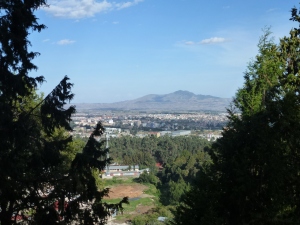
Capital of Ethiopia, and one of the fastest growing cities on the continent. Addis Ababa is a relatively new city dating from the late 19th century, and home to almost 4M people. It’s high too at a median of around 2,500 m. Rush up those steps and you have to stop to take a deep breath.
Kristian was also chasing a visa that was due to expire in two days time. The upshot was one of compromise – and fortunately one that meant that we could continue riding north – the Customs Officer agreed that he would get the papers faxed from Moyale and to get it sorted without us being arrested or having to ride back to Moyale. So, I waited with the bikes whilst Kristian hopped into the Customs Officer’s Land Rover and disappeared for about two hours.
I resigned myself for a long wait but, within five minutes, I was offered a seat in the shade by a second Customs Officer; then shortly afterwards a soft drink was provided. I sat enjoying my drink watching the soldiers messing about like a bunch of teenagers at a school bus stop, poking and teasing, texting and generally fooling around. Then one by one they came and asked my name and a few other questions before crowding around to have a group photo with me and the bikes. I had the presence of mind to offer my camera and I now have a classic shot of the soldiers in their blue outfits and Manchester United shirts making ‘Cool’ hand gestures when posing with me; my only regret is that none of them had a machine gun in hand.
All the while local traffic and buses were passing through the checkpoint, bribes were being taken from most of the bus drivers, and the soldiers and customs people alternated from being silly teenagers to hard-faced angry young men and women giving the local people a hard time and making a few dollars on the side.
Eventually Kristian returned and we went through the laborious process of filling out the forms, skillfully guiding the Customs Officer to ensure it wasn’t noticed that I am not Anna Surgeoner and all the insurance, bike documents, carnets, etc. didn’t match the details in my passport! And then we were off – three hours delayed, and with no chance of reaching Addis Ababa that day. Great feeling though.
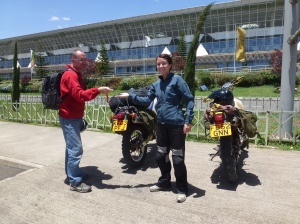
Anna’s turned up at Addis airport; and it’s my time to get back to London. Ceremonial handing over of the keys – first photo opportunity since Cape Town.
Driving into Addis Ababa the next day we had set out early – around 5.00 am – and along a very straight road and as the day went on more and more traffic built up, speeds were high, trucks and Land Cruisers belching thick black smoke and going very fast (sometimes passing centimetres from families on donkey carts and horses). I have this vivid memory, on one occasion, of fast heavy traffic in both directions with a horse standing right in the middle of the road, not moving, petrified, and seemingly abandoned.
Shaun Kelly
London
November 2012

Leave a comment